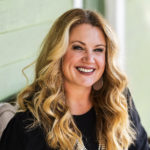
Grief Counseling: a Guide on Your Healing Journey
By: Kelly Karavousanos
Carrie entered counseling after she had experienced the stillbirth of her daughter, Kaylee. Carrie was married and had three other children under the ages of 8. Carrie said she wanted help and felt she had nowhere else to turn; it had been 8 months since Kaylee’s death, and she felt everyone was either tired of her being sad or expected her to get on with life. Even her best friend had told her that she needed to focus on her children and get herself together. She felt utterly alone. She knew her family loved her and wanted her to be ok but she could not figure out why she could not do what they expected. She could not “move on.”
We are forever changed by loss. After a death, we think differently, act differently, even love differently than we did before.
From the moment our loved one passes on, we will never be the same person we felt comfort in knowing. Although many of us understand this, we still struggle to wrap our heads, and our hearts, around it. It is one of many facets of grief that we resist the most. We don’t want to be different. We want things to always be how they were before. Like the times we were planning for the arrival of a new baby, or decorating for the holidays, or, simply, sharing our favorite meal. And, this resistance to the painful, overwhelming emotions of grief, can be paralyzing.
For some, seeing a grief counselor can help them get “unstuck” in a compassionate, caring environment.
An environment where people can be heard, validated, and supported. I have heard many give their reasons for why they think a grief counselor wouldn’t help. Everything from, “They can’t bring my loved one back.” (This is true!) Or, “Everyone experiences loss, I should be able to handle this on my own.” (This is both true and false.) Yes – everyone will suffer loss in their lifetime, but being able to cope with the intense emotions of grief is a different experience for each of us.
Grief counselors can be helpful in many ways. They may start by discussing basic education on the process of grief. This is not something we are taught in school and is not typically something that is discussed socially. How we grieve depends on a variety of things including the circumstances of and how the death occurred, previous death experiences, and religious and cultural beliefs and rituals. Some are looking for that checklist that will help them feel reassured that they are grieving “normally” or they are wanting to find a way to bypass the pain of grief.
Counseling helps by providing the space for the bereaved to express any emotion they are feeling and help them make sense of them.
In the book Being There for Someone in Grief, author Marianna Cacciatore gives a simple acronym, SALT, to learn by heart the four basic principles of support. Counseling provides space for these important principles. SALT stands for:
SEE them
ALLOW them
LISTEN to them
TRUST them
Seeing them means being in the presence of the bereaved’s pain without trying to do something about it or take it away–allowing the bereaved to do what they need to do to comfort their pain. If they need to go to the cemetery every day or talk, then allow them the space to do so. Listen. Listen to the same story, listen when you want to speak, just listen. Trust that only they know their path and you are but a companion alongside their journey.
The one true constant about grief is that there is not one “right” way to grieve.
A grief counselor can help by normalizing emotions and behaviors that the bereaved may experience. What happens after a loss can have us feeling like a fish out of water and questioning our every act and emotion. For many, grief is a natural process; however, there are some clear signs when a professional is needed. If you find you are isolating yourself from others, unable to complete your normal daily activities, having sudden changes in behavior, or thoughts of hurting yourself please reach out for help. It is difficult to be vulnerable with someone but that may be the best place for healing to begin.

About Kelly Karavousanos Kelly is a Licensed Professional Counselor working for Family Life Counseling in O’Fallon, MO. She is Certified in Thanatology through the Association of Death Education and Counseling. Kelly has been offering life transitions and grief support services for the last 15 years as well as conducting educational and grief support groups. She is a frequent educator to community groups on topics dealing with grief and loss. She attended Lindenwood University for her Masters in Counseling and has attended Grief Counseling Trainings with Alan Wolfelt, PhD at the Center for Loss and Life Transitions in Fort Collins, Colorado. She grew up in St. Charles and is raising her two children there as well.
